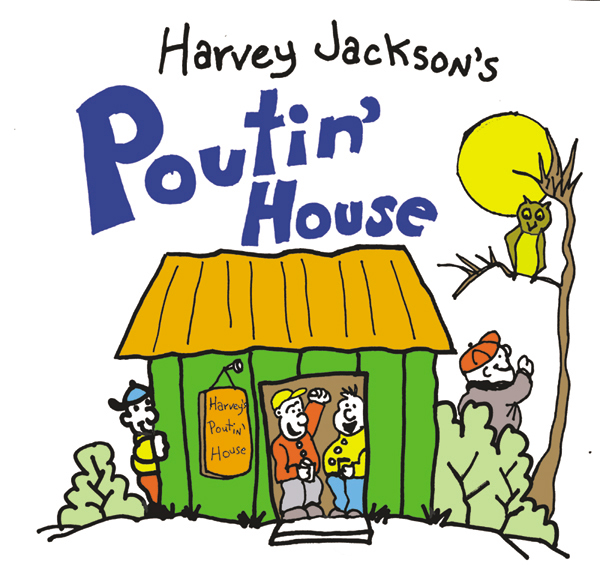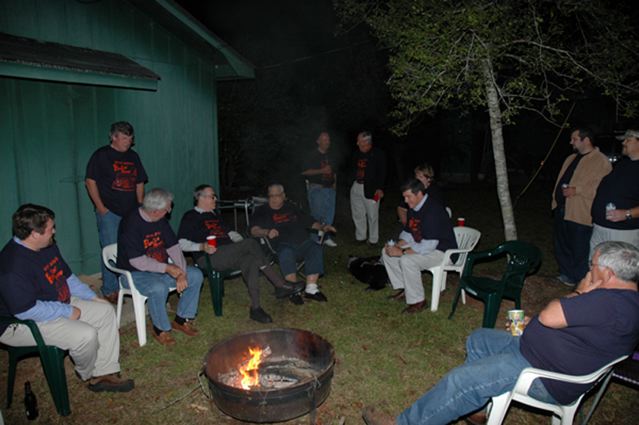
Harvey Jackson's
"The Poutin' House"


20th anniversary
Prayer Meeting Reunion
Wednesday, Nov. 8, 2006
5 p.m.
Grove Hill, Alabama

Ya'll
Come!
Web page
By Ed Williams
Department of Communication and Journalism
Auburn University


Gone South:
Puttin' and Poutin'
The Anniston Star
04-21-2004
The Legislature of the state of Alabama never ceases to amaze me.
Especially when it comes to passing innovative laws to get around other
laws. And of all the laws gotten around innovatively, liquor laws are
the most innovatively gotten around.
Consider. Back at the start of the 20th century, in an effort to shut
down honky tonks, the Legislature passed a law that prohibited the sale
of draft beer in the state. The theory behind the plan was that since
draft beer was consumed on the premises of such places, not allowing
draft beer would reduce the number of premises where beer was sold.
(Think about it, and when it makes sense you’ll know you are one of us.)
It probably sounded like a good idea at the time. Like the law that
made it illegal to serve a drink to someone standing up, passed on the
logic that if you keep drunks seated they won’t get in fights ‘cause no
one ever got in a fight sitting down.
But the Legislature soon had second thoughts about the draft beer
prohibition. (I’m back up on the first point, work with me now.)
Legislators learned that some of the immigrants who came to dig
potatoes and mine coal were gonna leave if they couldn’t get beer on
draft. So our representatives, to keep cheap labor on the job and the
Big Mules happy, passed another law that said that counties with a
significant immigrant population could have draft beer — which is why
the best seafood joints were in Baldwin County.
You still with me?
Now jump ahead. In 1992, legislators found themselves facing a bigger
problem. How to keep the rich and powerful tipsy and happy when the
poorer, weaker, prohibition-minded majority didn’t want them to be
either. Specifically, legislators were distressed to learn that one of
their former members was having trouble getting folks interested in a
golf course community he wanted to build in dry Marshall County. It
seems that the rich and powerful didn’t want to buy into a place where
the country club didn’t have a bar. So the Legislature passed a law
that created dry-county “community development districts” in which
beer, liquor and wine could be sold, so long as one municipality in the
county was wet. (That’s another example of a law to get around a law,
letting cities be wet when the county is dry, but let’s not go there
now.)
All you needed to get yourself one of those “districts” was a wet town,
200 residential sites, a country club with membership requirements, and
an 18-hole golf course. Those living outside the district had no say in
the matter.
But the problem didn’t go away.
Today, over in Blount County the golf course community of Limestone
Springs wants to get in on the “community development district” deal.
Sadly they are a little short of residential sites and Blount is bone
dry. But fear not, Sen. Pat Lindsey from down in Butler saw the problem
and introduced a bill that cut the number of home sites by half and
dropped the wet municipality provision. And before you could say, “make
mine a Miller” the Senate said OK.
It still has to pass the House. But if it does, I’m gonna give my Daddy
a call, ‘cause here is an economic opportunity that could secure him
comfortably in his twilight years — and strike a blow for the not so
rich, not so powerful or not so prohibitionary in the process.
One of those dry counties that will be affected by Lindsey’s bill is
the one in which my Daddy lives. But if this legislation passes that
will change – and Daddy is just the one to change it.
Back behind the family home are sites for 100 or more mobile homes and
trailers. Down by the creek is about five acres ideally suited for an
18-hole course, complete with windmills, dinosaurs and all those
obstacles folks love to putt around. And Daddy’s Poutin’ House will
make a first rate country club — membership included with the purchase
of a lot.
We got a friend with a bush-hog and another with a dozier. They can
clear and level. And we’ll sell the sites electricity from an outlet at
the “club” — just a nominal charge. The whole thing can be up and
running in six weeks, tops.
There’ll even be a few acres left over for those who don’t golf to
plant a patch and put up a deer stand.
POUTIN’ AND PUTTIN’ — that’s what we’ll call it.
Carpe diem, y’all.
About Harvey H. Jackson
Harvey H. Jackson is a professor and chairman of the history department
at Jacksonville State University.
Contact Harvey H. Jackson
E-mail:
hjackson@jsucc.jsu.edu


Gone South: Everyone should have a ‘Poutin House’
The Anniston Star
10-08-2003
My Daddy has a poutin’ house. And every one who learns of it wishes
they had one too.
Like so many institutions of this sort, the poutin’ house was not
created, it just evolved to meet a need. We trace its origins to the
late 1950’s, when Daddy built a top-of-the-line storage shed out back —
complete with running water and electricity. In it he put gardening
supplies, tools and a deep freeze for last year’s harvest. He also
installed a refrigerator for his beer and a cabinet to hold a bottle or
two.
He put the liquor out there because Mama was the granddaughter of a
teetotaling Methodist minister. She held pretty firm views on strong
drink and didn’t want "beverages" in her house. Daddy, whose genealogy
included a grandfather with his own personal bootlegger and a
grandmother with a charge account at a Montgomery beer joint, belonged
to the other camp.
But Mama and Daddy were (and are) a reasonable, loving couple, so they
struck a "bar out back" compromise, and everyone was happy.
This solution also kept drinking out of sight of visitors who might
drop in. The county where they live is dry and since Daddy was in
politics, discretion was clearly the best course of action.
In the months that followed friends were invited out from time to time
for an after-work toddy, and it wasn’t long before the "greenhouse"
(the shed was painted green) became known to a small circle as a place
to relax. Since most of the guest were associated with the courthouse
in some way, the talk naturally centered on politics. It was a lively
group, especially during campaigns, and who knows how often the fate of
an aspiring candidate may have been decided under the tin roof of
Daddy’s greenhouse.
Through the decades of the 60’s and 70’s, the greenhouse served the
county well. Even after its owner retired from politics, the
establishment continued to flourish. Old courthouse hands frequently
dropped by for a quiet drink and reflection, and a new generation of
local opinion shapers came out to listen and learn.
Meanwhile, the greenhouse was filling up. A child of the depression,
Daddy could not bring himself to throw away anything so shelves were
piled high with jars and bottles, boxes of various sizes, pieces of
rope and string, rusted tools and half-empty cans of dried-out paint
and putty whose resurrection was doubtful at best. Scraps of lumber and
sacks of fertilizer were stacked on the floor, and before long the only
way to get to the refrigerator was by a narrow path that wound its way
through the overflow. Finally, Daddy realized he had to either clean up
this house or build another.
So he called the carpenter.
The result reflected the man. Daddy’s new retreat included a stove,
sink, refrigerator, satellite connection, lots of cabinets for books
and bottles, and no telephone. He hung the walls with political
memorabilia and brought in chairs and a sofa so folks could sit. He
also added a bathroom, though regulars continued to wander outside and
find a bush. Old habits die hard.
Then the power company arrived to hook it up, and Daddy learned he had
a problem. "What’s the address?" Asked the man from the Rural Electric
Authority. "We need an address for the meter."
"Same as the main house," Daddy replied.
"Can’t be," was the response. "Separate meter needs its own
designation."
Daddy looked confused so the technician tried to help.
"What do you call this place?"
"This is my poutin’ house," Daddy answered. "When Mama chases me out,
I’ll come here to pout."
When the first electric bill arrived, it was addressed "Poutin’ House,"
and its been the poutin’ house ever since.
Pretty soon the regulars, who included (according to one unofficial
report) "the editor-publisher of the local newspaper, a couple of
renegade court officers, a retired Republican patronage holder and the
ranking elected law-enforcement officer of the local judicial circuit,"
began gathering every Wednesday night. They chose Wednesday because the
editor would have just picked up the weekly paper for its Thursday
distribution, and they could get the news before the rest of the
country. When all were assembled and drinks were poured, Mama would
bring out snacks.
And being Wednesday and all, they called it "prayer meeting."
That was 1986, and for the next decade or so, prayer meeting was the
highlight of the week. But things change. People pass away. Some drift
away. And Daddy has slowed down a bit. So now its quiet out there on
Wednesday nights.
Still, when I am down for a visit, Daddy and I and whoever else is in
the mood still go out there, talk politics, watch football, and just
enjoy being together.
Yessir, every man needs a ‘poutin house. I hope I get one when I grow
up.
About Harvey H. Jackson
Harvey H. Jackson is a professor and chairman of the history department
at Jacksonville State University.
Contact Harvey H. Jackson
E-mail:
hjackson@jsucc.jsu.edu

Thanks for visiting
Harvey Jackson's
"The Poutin House
Grove Hill, Alabama
A
fun time!

Ed Williams
willik5@auburn.edu
Department of
Communication
and Journalism
Auburn University